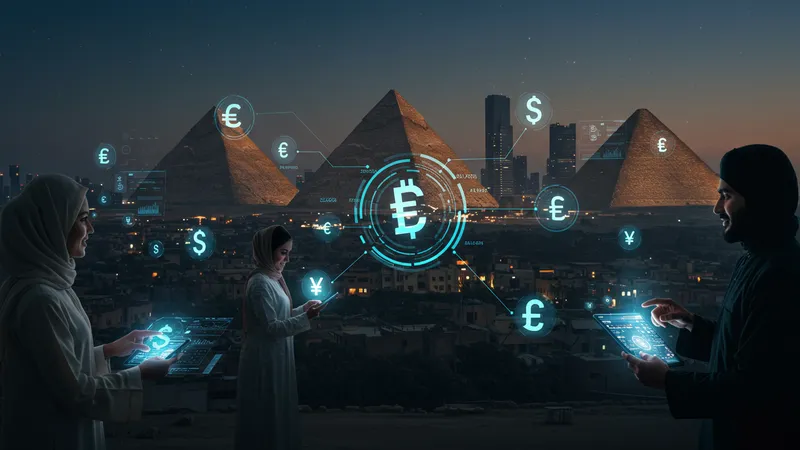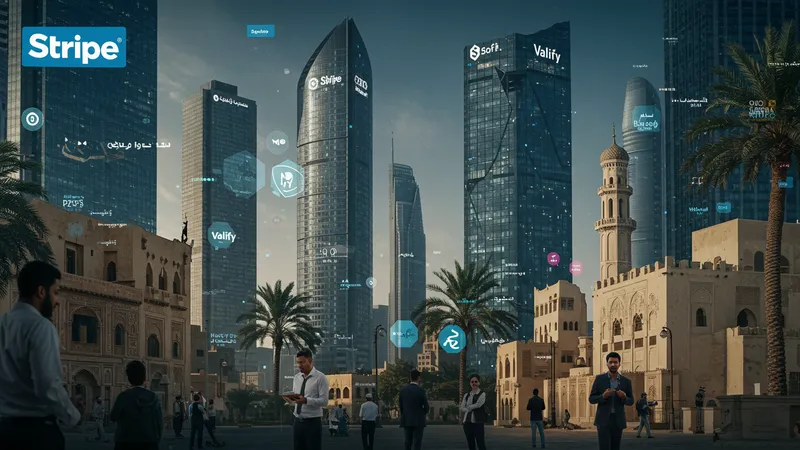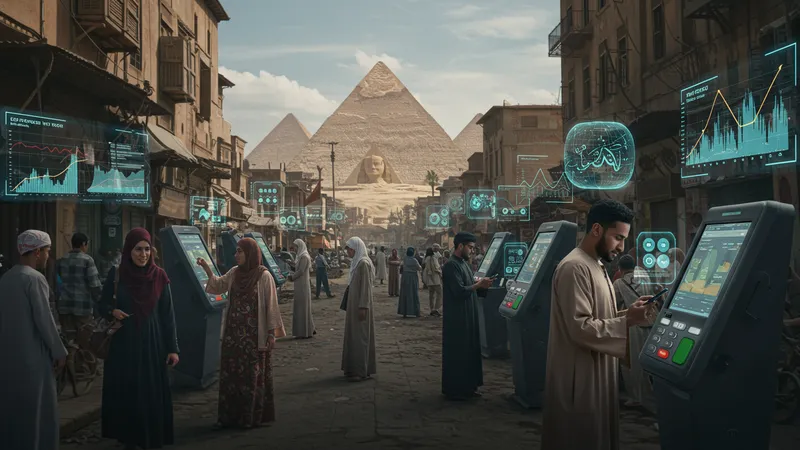

American fintech companies have revolutionized Egypt’s lending industry, leveraging technology to penetrate markets where traditional banks have long struggled. But their staggering influence might be more transformative than you think.
As post-pandemic economic shifts unfold, the demand for accessible, digital lending solutions in Egypt has skyrocketed. This intersection of necessity and innovation is reshaping the financial landscape in unprecedented ways.

Shockingly, Egyptian and American fintech collaborations are escalating at a pace no one anticipated, with apps like Fawry and E-Finance reported to double their user engagement over the past year. Interestingly, as these platforms offer quicker credit assessments using artificial intelligence, the entire loan approval process has shrunk from weeks to mere hours. But that’s not even the wildest part…
While local banks remain hesitant, external fintech stakeholders are stepping up with micro-loans fueling entrepreneurship in underfunded sectors. The shift is so profound that new micro-enterprises are contributing significantly to the GDP. This surge is creating not just wealth, but aspirations across the Egyptian socio-economic spectrum. Yet, the real twist is yet to unfold…
Will the technology and ease of access offered by American fintech platforms be the downfall of traditional banking as we know it? The rate of change has experts speculating on the sustained impact and potential regulatory challenges. What happens next shocked even the experts…
Recent data suggests that digital financial services permeate nearly every aspect of the Egyptian economy, with fintech companies at the helm. Mobile payment systems and online banking have seen a dramatic spike in usage, with over 36 million Egyptians now using Fintech services daily. These figures highlight not only the sector's rapid growth but also the tech-savvy shift among the younger population. But there’s another twist to this growth trajectory…

With the boom of fintech products, traditional Egyptian banks are suddenly in a race against time. They’re struggling to modernize at a pace that keeps up with the digital tide, making room for fintech giants to dominate the scene. Despite the challenges, there’s a silver lining: banks are now incentivized to innovate and collaborate in order to survive. This narrative, however, hides a deeper complication…
This rapid digital shift raises significant questions about cybersecurity and data privacy, areas where Egyptian regulators are still catching up. Cyber resilience will determine the long-term success of fintech in Egypt; yet, investments here are still shockingly low. As fintech continues to mature in Egypt, the stakes are high for risk management strategies among digital lending platforms. What you read next might change how you see this forever.
Amidst all this, the personal success stories emerging from the Egyptian fintech revolution are nothing short of inspirational. Entrepreneurs previously sidelined by traditional banking constraints are now thriving, reshaping entire communities. And yet, the full narrative of fintech’s human impact is far from complete...
The ascendancy of fintech in Egypt presents a formidable challenge to its traditional banks, with the likes of Commercial International Bank (CIB) and National Bank of Egypt scrambling to retain their market share. The immediacy and convenience offered by fintech solutions are hard for these incumbents to match without significant infrastructural overhauls. But there's more to this story...

Fintech's price competitiveness is especially threatening; transaction costs are significantly lower, and with seamless user interfaces, customer loyalty is rapidly shifting. Banks find themselves in a precarious position, requiring agile transformations to stay relevant. Yet, another profound change is underway that hasn't been fully acknowledged...
The old standard of collateral-based lending is dissolving as fintech introduces credit scoring systems that evaluate creditworthiness through algorithms analyzing a broader data set. This has opened credit avenues for demographics long deemed risky by traditional banks. As fintech firms continue this trend, their growing influence could redefine what was considered 'risk' until now. But the most surprising aspect remains hidden…
Regulatory bodies in Egypt are grappling with how to rein in this fintech wave, while simultaneously fostering innovation. It’s a delicate balance, as overly stringent regulations could stifle growth, yet lax oversight might lead to systemic risks. What’s next in the regulatory landscape will prove crucial for both fintech and traditional players alike. Brace yourself for the revelations to come…
Alongside economic shifts, American fintech’s influence on Egypt brings unexpected cultural transformations. The accessibility of microfinance is changing societal attitudes, especially in rural areas where traditional banking options were scarce. Suddenly, financial literacy and entrepreneurship are becoming common aspirations. This quiet cultural evolution holds a surprise...

The fintech-driven market has significantly diminished gender disparities in financial literacy and entrepreneurship opportunities. Women who once faced barriers now have direct access to creating and owning businesses via micro-loans and digital platforms. This empowerment is not just economic; it's social, encouraging a larger narrative of gender equality unexpectedly supported by fintech. However, the impact is even broader...
This democratization of finance hasn't just boosted prospects for individuals but has kickstarted grassroots movements advocating for broader economic inclusivity across different communities. But, behind this remarkable progress, a digestible tension persists: fintech might also homogenize cultural financial practices, potentially eroding unique local financial norms. The implications of this conflict are worth exploring further...
The accessibility of digital finance means that more people are engaging with global economic trends than ever before, blending traditional values with modern digital practices. The merging of these worlds shows a reinvention of culture itself, anchored by a financial revolution. Yet, the consequences of this artistic and financial renaissance stretch far beyond simple economic gains. What follows will illuminate these changes in an even more surprising light...
As fintech accelerates its grip on Egypt, policymakers face the daunting task of managing this growth while safeguarding the economy. The regulatory landscape is a complex web, with authorities striving to protect consumers without stifling innovation. It’s a delicate balancing act that poses its own set of challenges...

Current regulations focus heavily on financial transparency and consumer protection, yet the speed of fintech evolution often outpaces bureaucratic processes. There’s an acknowledged gap that fintech companies exploit, maneuvering quickly to establish dominance. But the true test lies in adaptability - whether the legal framework can evolve as rapidly as the technology. This tug-of-war reveals layers yet unseen...
To promote fintech innovation, regulators are exploring sandbox environments where startups can test products in controlled settings. These sandboxes offer a safeguard against potential market disruptions while encouraging creative solutions. Yet, the labyrinthine process of moving from testing to market still deters potential innovators. What lies beneath this regulatory approach is more profound than expected...
The global nature of fintech also means that Egypt’s regulatory challenges are not isolated. Cross-border transactions and international partnerships call for unprecedented levels of cooperation between countries. The future of Egypt’s fintech, therefore, hinges on how well these collaborations are managed—hinting at a landscape that is as political as it is financial. What comes next will define Egypt’s role on the global fintech stage...
One of the most potent impacts of American fintech in Egypt is seen in the transformation of individual lives, bringing previously unfathomable opportunities to those on the economic sidelines. Local stories of success now echoed globally, showcased ambitious endeavors funded by digital microfinance creating new micro economies. The question remains, what are the stories that truly define this transformation?

Take, for instance, young entrepreneurs such as Hassan El Shazly, who leveraged fintech platforms to bypass traditional banking constraints and launch his renewable energy startup. His story resonates with countless others who have unlocked opportunities previously gated by financial barriers. But the ripple effects of their successes tell a broader tale...
Fintech’s reach extends far beyond personal gain. It has empowered many like Hassan to reinvest in their communities, utilizing digital platforms to coordinate resources, offer employment, and mentor the next generation of entrepreneurs. Stories like Hassan's are just the beginning of a larger movement, redefining what financial collaboration means in Egypt. Yet there’s still an unspoken undercurrent of tension to explore...
Amidst these success stories, a less visible narrative persists—one that questions inclusivity's viability and the globalist ideals underpinning the fintech movement. As fintech firms race towards profit, the challenge is ensuring that economic empowerment remains broad-reaching, fostering sustainable development rather than just isolated success stories. This duality presents a stark choice for Egypt’s future: an inclusive, technology-driven economy or one marked by inequality. The answer could redefine everything we know...
Amidst the meteoric rise of fintech, a crucial question looms large for consumers and policymakers alike: what are the hidden costs of this digital revolution? The allure of fintech lies in its promise of lower costs and personalized services, but as the industry entrenches itself, unforeseen expenses arise from shadowy corners...

The convenience and accessibility of digital loans often mask high interest rates and fees embedded in complex algorithm-driven pricing. Many users are unaware until saddled with unforeseen financial burdens. This opacity poses significant risks, highlighting a need for more stringent consumer education and transparency. Yet, there’s a subtler cost playing out for all consumers...
Data privacy now finds itself a frontline conflict. With fintech companies holding vast troves of financial data, breaches or misuse could have catastrophic consequences. The conversations around data ownership and cyber security are only intensifying as these risks escalate. Still, the ramifications extend beyond individual consumers...
As fintech firms expand, they often overshadow smaller local enterprises, dictating market dynamics and pushing their profit-driven agendas. This monopolistic dominance can undermine local economic growth, raising a pivotal question: how can technology be harnessed for equitable growth? This is the dilemma that Egypt, along with the global community, must navigate. The conclusions drawn in addressing this challenge will be nothing short of revelatory...
In Egypt's fintech saga, a high-stakes showdown is brewing between global tech giants and local startups. Both sectors crave dominance and influence but play the game under drastically different rules—the results could upend the industry as we know it. What are their strategies and who will prevail?

American fintech behemoths like Stripe and SoFi leverage colossal resources and cutting-edge technology to offer expansive services at minimal costs. While their global strategies often pivot on setting benchmarks for innovation and scaling rapidly, Egyptian startups like Valify and MoneyFellows are treading a different path, tapping into local insights to deliver culturally relevant solutions. But the real twist lies elsewhere...
The battle is not solely about technological prowess but about penetrating societal norms. While international companies bring robustness, local innovators embody cultural nuances, agilely adapting to specific community needs. This balancing act between global prowess and local resonance is redefining market strategies and consumer choices alike. But the stakes of this clash run even deeper...
The market is flooded with potential, yet limited by infrastructure. As fintech innovators streamline operations and manage costs, their success ultimately hinges on cooperative symbiosis rather than cutthroat competition. The next evolutionary step in fintech requires a fusion—a harmonious blend of global efficiency and local empathy. The future is unfolding now, and what it reveals could rewrite the rules of global finance...
To truly harness the potential of fintech, education emerges as a critical pillar, one that could steer Egypt’s economic future towards unprecedented horizons. As digital platforms proliferate, educating consumers about fintech's benefits—and pitfalls—becomes imperative. What are the most effective strategies to ensure widespread financial literacy?
The Egyptian government and fintech companies have initiated joint ventures to raise awareness and impart financial literacy in schools and communities. Programs like the Central Bank’s fintech inclusion campaigns aim to demystify digital finance for everyday users. Yet, the real challenge lies beyond mere awareness-building...
True empowerment means translating knowledge into actionable skills, allowing individuals across demographics to navigate digital financial landscapes with confidence and authority. This demands an overhaul in current educational curricula, integrating fintech at every academic level. But these efforts face formidable hurdles...
Resistance often arises from entrenched traditionalists wary of rapid digital shifts. Contrasts between generational mindsets can stall progress, despite the clear advantages of fintech education. Aligning these perspectives is crucial, offering a chance to bridge divides and foster an adaptable population ready to thrive in the digital age. Ultimately, success will depend on a collective commitment towards inclusive education and its transformative potential...
As Egypt's fintech revolution forges ahead, crystal ball gazing into its future reveals a blend of optimism and uncertainty. The landscape, shaped by technological innovation, regulatory reform, and cultural adaptation, offers fertile ground for growth. What lies within this promising yet unpredictable future?

Optimists foresee a digital economy unlocking unprecedented levels of accessibility and efficiency. Tools for rapid credit assessment, streamlined asset management, and real-time analytics will redefine business operations and consumer experiences. But, adopting these advancements requires navigating complex transitional waters...
Pioneering fintech enterprises are steering the industry, yet face crucial decisions—whether to disrupt with groundbreaking technology or cooperate in enhancing existing systems. Collaborations between stakeholders will shape the path forward, determining fintech’s place within broader economic strategies. Meanwhile, another dimension unfolds beneath the surface...
The human element—the way individuals engage with and adapt to these changes—will ultimately define fintech’s legacy in Egypt. The diverse responses to economic innovation highlight the broader societal shifts underway, embroiled with both enthusiasm and skepticism. As the nation embarks on this digital journey, its success or failure hinges on embracing inclusive growth, a unified vision, and progressive policymaking. The horizon holds endless possibilities for those willing to innovate...
As the message echoes from digital to tangible, the impact of American fintech on Egypt's financial landscape is indisputable, embodying a new era of economic prosperity, accessibility, and empowerment. This isn’t just a localized disruption; it's a global paradigm shift redefining finance and society. Yet, only collective, mindful navigation will expand these innovations into sustainable progress.
Your role in this unfolding story is pivotal; share this narrative, spark discourse, and join the movement towards a digitized economic future. Together, with awareness and action, we can shape the trajectory of fintech not just in Egypt, but across the world. Bookmark this page, re-read these stories, and become part of tomorrow’s solutions.